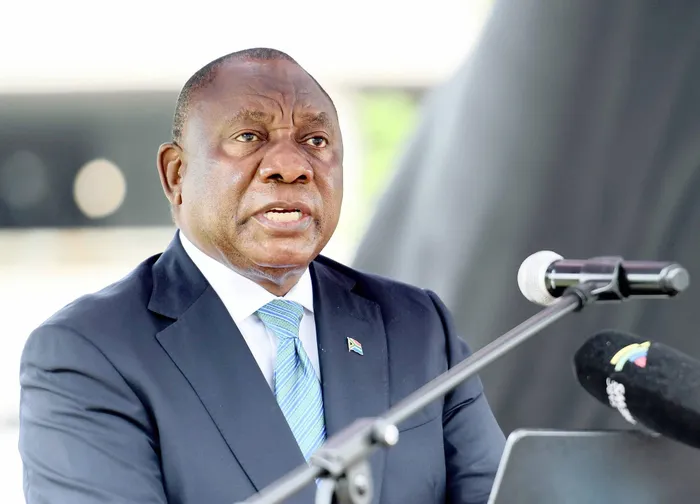
President Cyril Ramaphosa has expressed concern over the persistent underspending by municipalities on essential infrastructure projects.
Image: Jairus Mmutle / GCIS
The issue of municipalities underspending their allocated budgets is highly unacceptable, particularly when it comes to spending on infrastructure allocations such as housing, education, water and roads. That’s the word from President Cyril Ramaphosa.
He said this while responding to questions for oral reply in the National Council of Provinces (NCOP) on Wednesday afternoon, in Bouwmeester Dome in Cape Town.
Among other issues, Ramaphosa will address the Government of National Unity’s stance on Black Economic Empowerment, a proposed social compact to rebuild the economy, youth unemployment and weaknesses in budgetary management and service delivery at the municipal level.
He noted concerning trends of underspending by provinces and municipalities and the resulting impact on the state’s ability to deliver quality services to communities.
“The issue of underspending is quite an important issue, particularly when it comes to spending on infrastructure allocations such as housing, education, water and roads. This is of great concern,” Ramaphosa said.
He was responding to a question by Kenneth Mmoiemang of the ANC in the Northern Cape on whether the government has assessed the impact of inadequate spending by provinces and municipalities on their commitments to deliver quality and essential services - particularly crucial infrastructure such as housing, schools and roads.
He also asked whether the government is engaging with provinces and municipalities that continue to underspend and fail to utilise their allocated service delivery budgets effectively.
“I actually often characterise it as treason against the people of South Africa when monies that have been allocated are not spent and returned back to the Treasury,” Ramaphosa said.
“Inadequate or slow capital expenditure by municipalities and provinces has in many ways hampered the delivery of the services that are due to our people.”
He said this often results in delays in housing delivery and stalled infrastructure projects such as schools, water, sanitation and waste management.
“It also erodes public trust in the state’s ability to improve the livelihood of our citizens and exacerbates service delivery protests.”
Ramaphosa attributed the inability of many municipalities to spend their capital budgets to poor management, weak planning and implementation, and inadequate financial and supply chain management.
“The national government continues to engage directly with provinces and municipalities to demonstrate that persistent underspending is not acceptable,” he said.
He said key interventions include budget monitoring forums coordinated by the National Treasury to track in-year spending and detect low expenditure patterns early.
These are supported by Section 154 interventions from the Department of Cooperative Governance, which aim to strengthen institutional and financial capacity in municipalities.
Ramaphosa said capacity-building programs are organised through the Municipal Infrastructure Support Agent to address skills shortages, especially in planning, engineering and project management.
The Cabinet has appointed an interministerial committee on municipal turnaround, which is working to support distressed municipalities across the country.
“One of the strategic priorities of this administration is to build a capable and developmental state,” Ramaphosa said.
“This involves strengthening intergovernmental coordination and accountability, and introducing an early warning system. Operation Vulindlela is implementing reforms to enable this effort and strengthen local government.”
He said dedicated working groups have been established in eThekwini and Johannesburg to help address infrastructure challenges, particularly in water and electricity.
“Finally, the Metro Trading Services Reform Program has been initiated by the National Treasury to support institutional and financing reforms aimed at increasing investment in infrastructure,” he said.
“This is an innovative initiative that is going to see great changes being introduced.”
Ramaphosa said these measures will help address the root causes of underspending and ensure infrastructure is maintained and expanded to improve service delivery.
“This is something that the seventh administration is focusing on very, very strongly, and we are hoping that as time goes on, we will see really good results as we reform and restructure our municipalities.”
Many municipalities continue to face challenges in delivering basic services such as water, electricity, housing and road maintenance.
Most municipalities received unqualified audit opinions with findings, indicating credible financial statements but poor performance reporting and compliance.
Maluleke said that 219 municipalities spent R1.47 billion on consultants, yet many still submitted flawed financial statements, an ongoing issue that has shown little improvement over the past decade.
simon.majadibodu@iol.co.za
IOL Politics